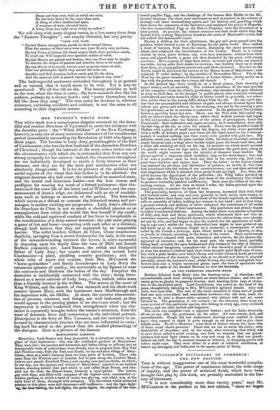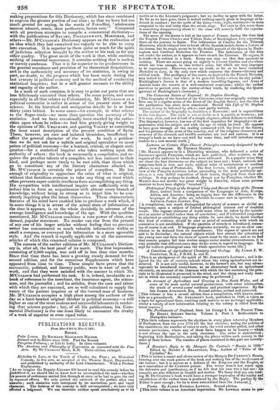m'cuiLocn's DICTIONARY OF COMMERCE : THE NEW EDITION.
THIS is without exaggeration one of the most wonderful compila- tions of the age. The power of continuous labour, the wide range of inquiry, and the power of artistical finish, which have been brought into play by this work, are probably unrivalled in the his- tory of literature. " It is now considerably more than twenty years," says Mr. M'Cuz.z.oca in the preface to his new edition, since we began making preparations for this Dictionary, which has since continued to engross the greater portion of our time; so that we have but too much ground for saying, in the words of Forcellini, t adolescens manna admovi, senex, dam perficerem, factus sum:" Compared with all previous attempts to compile a commercial dictionary— with the publications of SAYARY, POSTLETH WATT, MORTIMER, and others—Mr. M'Curxoeu's Dictionary appears as the realization of an idea which they had conceived too vaguely to be able to carry into execution. It is superior to them quite as much for the spirit of judicious selection brought by the author to his task as for any other quality. The great merit of the work is that, while omitting nothing of essential importance, it contains nothing that is useless or merely cumbrous. That it is far superior to its predecessors in the general soundness and precision of its theoretical disquisitions, and in the authenticity and accuracy of its statistics, is owing in part, no doubt, to the progress which has been made during the last century in political economy and in the method of conducting statistical inquiries; but in a still greater measure to the ability and sagacity of the author. In a work of such compass, it is easy to point out parts that are less felicitously executed than others. On some points, and more especially in all that relates to Colonization, Mr. M'Cueeocil as a political economist is rather in arrear of the present state of his science. In his historical and antiquarian details he is at least thirty years behind. In some cases—for example, in what relates to the Sugar-trade—we more than question the accuracy of his statistics. And we have occasionally been startled by the autho- rities upon whom he relies—to find him gravely giving weight to the opinions of Mr. URQUHART, and quoting VOLNET as containing the most exact description of the present condition of Syria. These, however, are rare and isolated blemishes, insufficient to affect the general character of the work. In such a publica- tion we do not ask for a subtile and original speculator on moot points of political economy—for a learned, critical, or elegant anti- quarian—for a statistical inquirer who takes nothing upon the authority of others: the book is necessarily a compilation, and re- quires the peculiar talents of a compiler, not less eminent in their kind, and perhaps more rarely to be met with, than those which go to constitute any of the literary characters alluded to. Mr. Weyer-0ml is certainly the prince of compilers. He has enough of originality to appreciate the value of what is original, without that fastidious aversion to take any thing on trust which often prevents super-subtile intellects from accomplishing any thing. His sympathies with intellectual inquiry are sufficiently wide to induce him to form an acquaintance with almost every branch of knowledge, without being so strong as to impel him to be con- stantly inquiring after the latest discoveries. These characteristic features of his mind have enabled him to produce a work which, if lit some things it is in arrear of the actual state of information at the time it appears, is on the whole decidedly in advance of the average intelligence and knowledge of the age. With the qualities mentioned, Mr. M'CoeLocil combines a rare power of clear, con- densed, popular statement. No reader can rise from the perusal of any one of his larger articles without feeling that no previous writer has concentrated so much valuable information within so small a compass, or conveyed his information in a more agreeable style. And the remark is equally applicable to all the numerous articles of which this crammed volume is composed.
The success of the earlier editions of Mr. M'Cuemen's Diction- ary is, after all, the best proof of its merit. The first impression, consisting of 2,000 copies, was sold off in less than nine months. Since that time there has been a growing steady demand for the second edition, and for the numerous Supplements which have appeared from time to time. These simple facts prove that the mercantile, political, and literary public, were in want of such a work, and that they were satisfied with the manner in which Mr. AtCta.z.oett had performed his task. It is, indeed, invaluable as a book of reference to the merchant, the insurance-agent, the states- man, and the journalist ; and its articles, from the care and talent with which they are executed, are as well calculated to supply the wants of the patient inquirer as of the hurried man of business. Mr. M'Cux.Loca occupies a high place among the authors of the day as a hard-headed original thinker in political economy—a still higher as one of the most zealous and successful labourers in render. ing that science popular ; but, of all his publications, his Com- mercial Dictionary is the one least likely to encounter the rivalry of a work of superior or even equal value.



























 Previous page
Previous page